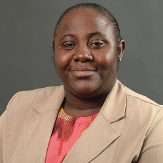October 2020: Abiola Acanmu

Abiola Akanmu
Assistant Professor of Practice
Myers-Lawson School of Construction
PhD, Architectural Engineering, Pennsylvania State University
MEng, Structural Engineering, Bayero University Kano, Nigeria
BEng, Civl Engineering, Bayero University Kano, Nigeria
Email abiola@vt.edu
How do you see your work contributing to the goals and vision of IIHCC?
Part of what I’m doing right now is looking at “smart cities” and “smart environments”, which ties into these goals because we are looking at environments that are inclusive. When I say inclusive, I’m not necessarily talking about diversity. I’m talking about cars interacting with and understanding people, vehicles understanding people, and people understanding people, and being able to embed intelligence into environments and into human-centered communities. We are also looking into the construction environment specifically where we have what is called “smart design and construction,” which pulls intelligent infrastructure into the physical creation of human-centered communities.
Some of my work in the area of future workforce development surrounded embedding and implementing various sciences into the construction site to reduce issues regarding safety, cost leaks, productivity losses, etc. All of this goes into teaching students how to implement sciences into environments to make those environments intelligent. Typically, construction sites are very dynamic environments, so the people making administrative decisions need real-time information in order to make quick decisions that protect and improve the quality of life for their construction workers.
What other areas outside of your discipline would you entertain for future research and proposal work?
One proposal I’m working on right now that is totally outside of my discipline (construction and what goes on at the job site) -actually in the area of education- is looking at what is happening with the skill gaps in the construction industry and other industries. Some instructors may not be able to talk about, for example, bidding procedures because they do not engage with current bidding procedures as part of what they do, which means that teaching a topic like that would require someone from the industry to teach that topic effectively to the students. Unfortunately, access to those experts can be limited. Even when there is access, there may be conflicts in the time requirements. This is a huge challenge for under-resourced institutions and minority-serving institutions. Thus, we are trying to make access to industry standards easier to achieve by developing a cyber infrastructure that links all the institutions in the nation to architectural, engineering, and construction companies. Ultimately, our goal will again be to improve mental health and wellbeing of the people, within the context of smart cities and communities while being cognizant of their technology acceptance.


